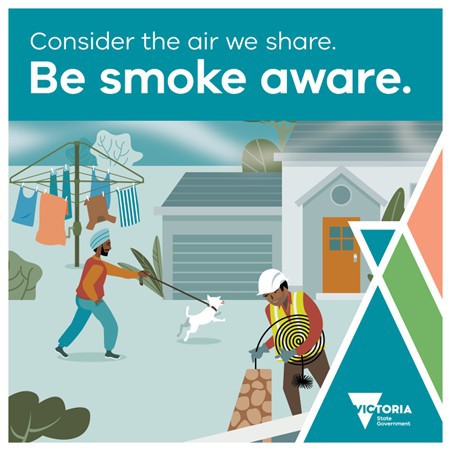Smoke from woodfire heaters
Buying the right wood heater, using it correctly, maintaining it well and burning the right type of wood are some simple measures you can take to protect your neighbours from smoke pollution and keep your house warm.
Health impacts and risks
Brief exposure to smoke doesn’t generally lead to immediate health problems, but it can have effects on:
- people with heart or lung conditions
- pregnant women
- young children
- the elderly.
Exposure to smoke can:
- trigger asthma
- worsen heart disease.

Environmental impacts
Smoke generated from woodfire heaters contributes to air pollution as very small particles and gases are released into the atmosphere (including carbon dioxide, carbon monoxide, nitrogen oxides and volatile organic compounds).
The burning of firewood in some older-style wood heaters may produce methane and black carbon particles that increase global warming when compared to electric heating powered by renewable energy.
What you can do
Stop using your woodfire heater and upgrade it to a cleaner and more efficient form of heating. Find out how you can switch to energy-efficient, all-electric heating.
If your woodfire heater is the only source of heating, remember the following tips:
- ensure it complies with Australian Standards AS 4012 and AS 4013 (if your current woodfire heater does not comply, it is recommended you upgrade it to a cleaner and more efficient form of heating).
- use a moisture meter to test the moisture content of the wood and ensure it contains no more than 20 per cent moisture
- don’t allow the wood heater to smoke or smoulder
- allow air to flow through and never overload the wood heater
- regularly clean the woodfire heater and remove ash
- ensure the flue is cleaned at least once per year before winter
- ensure the tip of the flue is above your neighbour’s roof line.
Talk to your neighbours as smoke from woodfire heaters (even when operated correctly) can be harmful to their health.
Choose the right wood
Always use dry, seasoned and untreated hardwood. This means wood:
- dried over time in nature or kiln dried
- with no chemicals – for example, paints or stains.
This type of wood is best for burning because it makes more heat and less smoke than other wood and it does not clog your wood heater’s flue.
When you buy dry, seasoned and untreated hardwood, use it straight away.
It's cheaper to buy wood unseasoned in spring and dry it yourself. To dry your unseasoned hardwood:
- store it for at least 8 months in a shed or covered area that has good air flow
- stack the wood in a criss-cross pattern to allow for air flow.
Always use the type of fuel listed on the heater’s compliance plate and check the manufacturer's guide to safe fuels.
What not to burn in your wood heater
Burning the wrong things in your wood heater can make toxic smoke.
In your wood heater, do not burn:
- coal
- coke, which is a fire fuel made from coal
- driftwood
- household rubbish
- painted wood, which can contain chemicals
- treated timber or green-coloured pine logs – for example, those used at parks and playgrounds.
What we are doing
Our Act and Adapt Sustainable Environment Strategy 2023-2028
Our Act and Adapt Strategy 2023-2028 includes initiatives that support the community to reduce emissions at home.
We provide support to householders to go electric on our website Go electric with complimentary Council-backed program - City of Port Phillip.
Council requirements
Through the Community Amenity Local Law 2023, Council manages concerns with smoke which is generated from incinerators, fires and open air burning, as follows:
47. Incinerators, fires and open air burning
(1) A person must not light or allow any fire to be lit in the open air or in an incinerator on any land.
(2) The prohibition in sub-clause (1) does not apply to a fire which is approved by a permit for a special event.
(3) Subject to the requirements of any other legislation, the prohibition in sub-clause (1) does not apply to a person who uses a barbecue for the purposes of cooking food.
(4) For the purpose of sub-clause (3) a barbecue is a device specifically designed and constructed for the purpose of cooking.
Regulation and manufacture of woodfire heaters
The Environment Protection Authority (EPA) regulates the manufacture and supply requirements of solid fuel heaters.
In Victoria, woodfire heaters must comply with Australian Standards AS 4012 and AS 4013 to minimise air pollution, health impacts, amenity concerns and the effects on the environment. Solid fuel heaters must be installed by a registered or licensed person with the Victorian Building Authority (VBA) in Mechanical Services.
However, even when woodfire heaters are operated correctly, the smoke is a contributor to environmental air pollution as very small particles and gases are released into the atmosphere and cause air pollutants.
To find out more on smoke from woodfire heaters visit the Victorian EPA's website.